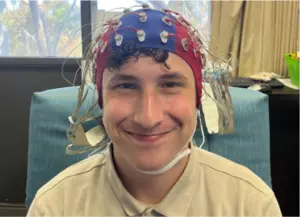Jackson Slocum ’24 – The Impact of Filmmaking Techniques
I conducted a summer research project on the impact of filmmaking techniques on memory and emotionality. As someone passionate about both human psychology and film, I sought to create a study that would allow me to connect my two interests. I found the pre-existing research on the psychological impacts of film to be somewhat lacking, and so I sought to investigate how the use of color and music in a film could impact a viewer’s memory for key details and their emotional response to an anxiety-provoking thriller. I shot a 5-minute thriller with 4 different versions: one with color and music, one in black & white without music, one with just music, and one with just color. Study participants were shown one, and only one, version of the short film and asked to answer a quick questionnaire upon completing the video. The questionnaire was divided into three parts: a free-recall memory section that asked participants to freely recall certain details from the film, an emotionality section that asked participants to place their anxiety levels on a 7-point scale, and a second memory section with multiple choice answers to identical questions from the first memory section to test participant recognition of details.
Eliza Koch ’24 – What is Missing from Sex Education: Communication, Safe(r) Sex, ...and Pleasure
Sex education primarily focuses on reducing the negative consequences associated with sex, such as STIs, unplanned pregnancies, and violence. Pleasure is often left unaddressed despite the impact it has on not only sexual health, but also physical, mental, and relationship health. Since most research on sex education has similarly focused on addressing the risks of sex, the present study investigated how people learn about pleasure outside of classrooms. Nine female or fem-identifying participants aged 20-24 completed interviews about their experiences learning about sex. They described learning from parents, peers, partners, and media. Grounded theory was used to code interview transcripts and develop a codebook. Overall, participants identified flaws in learning from each source they described, such as uncomfortable learning environments and widespread misinformation. These flaws indicate a need for improvements to sex education, such as promoting communication and media literacy skills.



